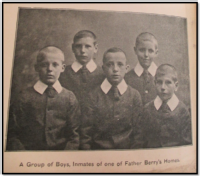Calendar
seminar: Dr Eloise Moss (Manchester) 'For whose convenience? Consent, criminality, and the economy of welfare in child emigration schemes between North West England and Canada, 1870-1930'
Presentation, refreshments, discussion. All are welcome.
Between 1865 and 1935, over 90,000 impoverished or ‘delinquent’ children resident in industrial schools, workhouses, and charitable ‘homes’ in Britain were assisted to emigrate to Canada by local charitable and religious institutions. Children were described as ‘friendless,’ a term that conveyed their families’ literal and figurative abandonment of them despite many having extant family in Britain, who did not always realise they had consented to emigration until it was too late. At the receiving end, children up to the age of seventeen supplied the Canadian agricultural labour market, domestic service, and adoption schemes. The North West of England was the region that formed a nexus for emigrating institutions in this period, but has received comparatively little analysis in relation to London-based emigrating networks (of which Barnardo’s was pre-eminent). Facing high levels of immigration, unemployment, crime, and child poverty, institutions in Liverpool and Manchester established the systematic emigration of children to Canada in the 1860s. In 2013, a deposit of archives of one Catholic organisation, the Nugent Care Trust, at Liverpool Records Office provided over 90 boxes of detailed files on these cases available for public consultation. This paper brings this fresh material into conversation with records of ‘Home’ children held in Canadian archives for the first time. In doing so, it illuminates significant tensions between institutions’ ideology of child welfare and the everyday administrative and financial concerns that characterised exchanges over child migrants between the Canadian Department of Agriculture and emigration agencies. It also offers important new insights into the legal and emotional contours of consent to emigration by children. Through eliciting the agency of juvenile migrants when the concept of childhood as a discreet life-stage was still evolving (Lawrence and Starkey, 2001; Flegel, 2009; Frost, 2009), this paper reframes the position of the individual within the broader economy of child emigration in this era. Linking these records for the first time will also expose a crucial phase in the development of modern child welfare systems transnationally, since the separation of parent and child remains a feature of certain state-led practices where a child is deemed ‘at risk’. This is a timely project with results that could have immediate policy implications, since the UK government’s Independent Inquiry into Child Sexual Abuse is currently investigating child emigration after the Second World War, without sufficiently exploring its historical antecedents and legacy.

